I was looking for a free K-type thermocouple linearization and cold junction compensation code online and couldn’t find it, so I wrote one. It’s on my github.
There are some libraries available that use polynomial based linearization, but those are not really suitable for embedded applications as floating point operations and math functions take a lot of program space. Besides, it’s possible to achieve the same or better accuracy using a hand-picked lookup table with less code.
The idea is like this - pick up some points and interpolate the unknown
values linearly.
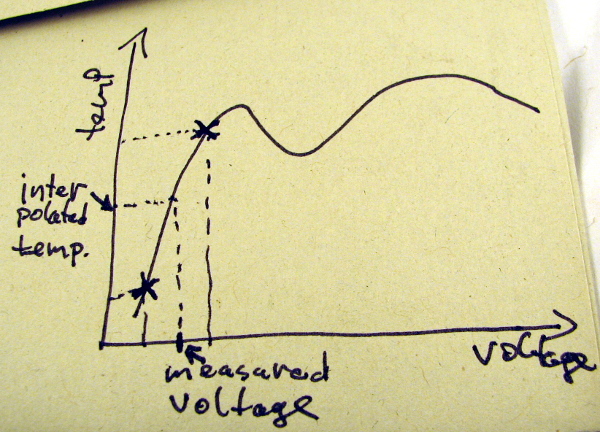
Points do not have to be distributed evenly. One can put more points in more nonlinear parts of the response one is trying to approximate. I’ve chosen 65 points and shuffled them around to get the minimal error. Data was taken from K-thermocouple tables provided by NIST.
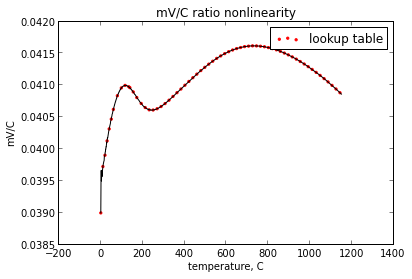
I’ve used fixed point arithmetics for all the calculations. This makes the library lightweight when compared to polynomial-based libraries that use floating point operations.
On the plots below you can see a characterization of errors introduced by the algorithm. The temperature conversion accuracy is typically less than 0.06 degrees C for a K-type thermocouple. My library produces slightly better results with less code.
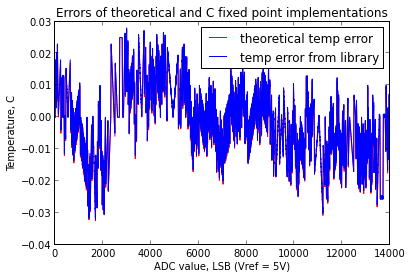
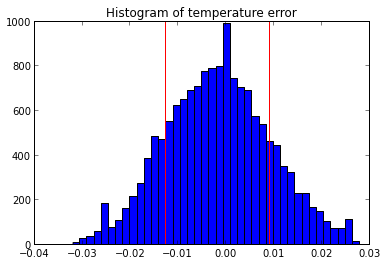
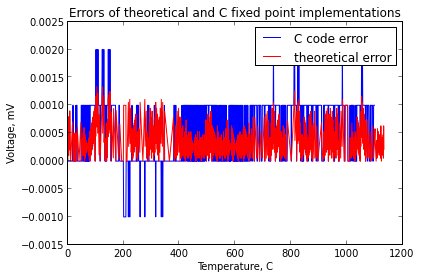
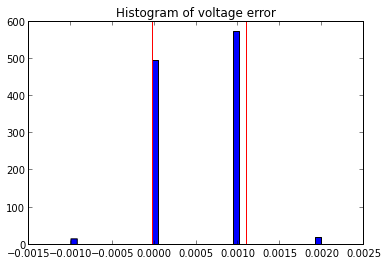
The code currently does not support negative ambient temperatures, it’s work in progress. I’m open for comments and questions. Ping me if you find it useful.
#define POINTS_COUNT 65
typedef struct {
long temp;
unsigned long microvolts;
} temp_point;
static temp_point thermocouplePoints[] = {
{ 0 , 0 },
{ 10000 , 397 },
{ 20000 , 798 },
{ 30000 , 1203 },
{ 40000 , 1612 },
{ 50000 , 2023 },
{ 60000 , 2436 },
{ 79000 , 3225 },
{ 98000 , 4013 },
{ 116000 , 4756 },
{ 134000 , 5491 },
{ 139000 , 5694 },
{ 155000 , 6339 },
{ 172000 , 7021 },
{ 193000 , 7859 },
{ 212000 , 8619 },
{ 231000 , 9383 },
{ 250000 , 10153 },
{ 269000 , 10930 },
{ 288000 , 11712 },
{ 307000 , 12499 },
{ 326000 , 13290 },
{ 345000 , 14084 },
{ 364000 , 14881 },
{ 383000 , 15680 },
{ 402000 , 16482 },
{ 421000 , 17285 },
{ 440000 , 18091 },
{ 459000 , 18898 },
{ 478000 , 19707 },
{ 497000 , 20516 },
{ 516000 , 21326 },
{ 535000 , 22137 },
{ 554000 , 22947 },
{ 573000 , 23757 },
{ 592000 , 24565 },
{ 611000 , 25373 },
{ 630000 , 26179 },
{ 649000 , 26983 },
{ 668000 , 27784 },
{ 687000 , 28584 },
{ 706000 , 29380 },
{ 725000 , 30174 },
{ 744000 , 30964 },
{ 763000 , 31752 },
{ 782000 , 32536 },
{ 801000 , 33316 },
{ 820000 , 34093 },
{ 839000 , 34867 },
{ 858000 , 35637 },
{ 877000 , 36403 },
{ 896000 , 37166 },
{ 915000 , 37925 },
{ 934000 , 38680 },
{ 953000 , 39432 },
{ 972000 , 40180 },
{ 991000 , 40924 },
{ 1010000 , 41665 },
{ 1029000 , 42402 },
{ 1048000 , 43134 },
{ 1067000 , 43863 },
{ 1086000 , 44588 },
{ 1105000 , 45308 },
{ 1124000 , 46024 },
{ 1143000 , 46735 },
{ 1200000 , 48838 }
};
static inline unsigned long interpolate(unsigned long val, unsigned long
rangeStart, unsigned long rangeEnd, unsigned long valStart, unsigned
long valEnd) {
return rangeStart + (rangeEnd - rangeStart) * (val - valStart) /
(valEnd - valStart);
}
static inline unsigned long interpolateVoltage(unsigned long temp,
unsigned char i){
return interpolate(temp, thermocouplePoints[i-1].microvolts,
thermocouplePoints[i].microvolts, thermocouplePoints[i-1].temp,
thermocouplePoints[i].temp);
}
static inline unsigned long interpolateTemperature(unsigned long
microvolts, unsigned char i){
return interpolate(microvolts, thermocouplePoints[i-1].temp,
thermocouplePoints[i].temp, thermocouplePoints[i-1].microvolts,
thermocouplePoints[i].microvolts);
}
/**
* Returns the index of the first point whose temperature value is
greater than the argument
**/
static inline unsigned char searchTemp(unsigned long temp) {
unsigned char i;
for(i = 0; i < POINTS_COUNT; i++) {
if(thermocouplePoints[i].temp > temp) {
return i;
}
}
return POINTS_COUNT-1;
}
/**
* Returns the index of the first point whose microvolts value is
greater than the argument
**/
static inline unsigned char searchMicrovolts(unsigned long microvolts) {
unsigned char i;
for(i = 0; i < POINTS_COUNT; i++) {
if(thermocouplePoints[i].microvolts > microvolts) {
return i;
}
}
return POINTS_COUNT-1;
}
/**
* Returns temperature as a function of the ambient temperature and the
measured thermocouple voltage.
* Currently only positive ambient temperature is supported
**/
long thermocoupleConvertWithCJCompensation(unsigned long
microvoltsMeasured, unsigned long ambient) {
//convert ambient temp to microvolts
//and add them to the thermocouple measured microvolts
unsigned long microvolts = microvoltsMeasured +
interpolateVoltage(ambient, searchTemp(ambient));
//look up microvolts in The Table and interpolate
return interpolateTemperature(microvolts, searchMicrovolts(microvolts));
}